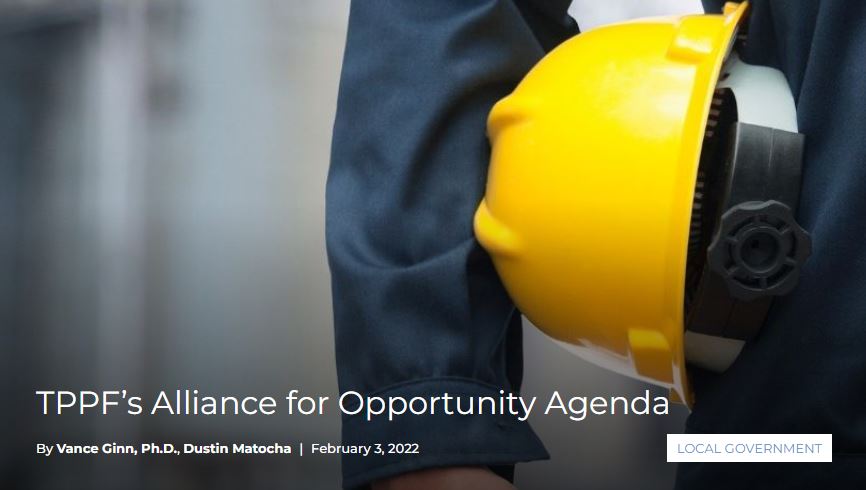|
Texans are ready to return to work.
Due to the COVID-19 pandemic and forced business shutdowns by state and local government mandates, Texas’s unemployment rate in December sits at a staggering 7.2%, compared to 3.5% the previous year. Not only is unemployment high, but many businesses have failed or are on the verge of failing. What can we do about it? TPPF’s Responsible Recovery Agenda would help speed up the recovery so Texans can regain their prosperity through a pro-growth approach of spending less, taxing less, and regulating less. Having state government do less now—while understanding in some areas that will be difficult—is the solution to doing more for Texans tomorrow. Spend less. Gov. Abbott noted in his recent State of the State speech that “we must balance the state budget without increasing taxes.” So far, this has been the case for the current 2020-21 budget and for the House and Senate versions of the 2022-23 base budget of about $251 billion. This amount is under TPPF’s Conservative Texas Budget of $246.8 billion because $6 billion is for maintaining property tax relief from last session instead of growing government. Continuing to reduce spending and accepting budgets below this representation of the average taxpayer’s ability to pay (meaning population growth plus inflation) will allow Texas to start making strides toward economic recovery. This should include strengthening the state’s weak spending limit for the long run as would be the case with HB 594 (Krause) and HB 910 (Parker). Tax less. Although taxes are necessary to fund government programs, they distort and limit economic activity in the private sector. During a time when many Texans are struggling to make ends meet, tax increases must be off the table. In fact, there should be a continued push for tax relief. While SB 2 last session provided historic reforms to the property tax system, there are already those interested in rolling back those reforms which must be maintained and even improved upon. One way is to clarify the “disaster loophole” that some local governments are using to substantially raise property taxes. By appropriately limiting spending, more tax relief is possible while continuing the action last session of moving Texas’s tax system more toward an efficient, fair, and pro-growth sales tax system. Movement is afoot in the Legislature to limit state spending so surplus dollars can replace school districts’ maintenance and operations property taxes, which comprise nearly half of total property taxes paid statewide. This could be done through different approaches like HB 958 (Oliverson), HB 59 (Murr), or others on the way. Another tax to consider cutting is the business franchise tax, often called the margins tax. This tax limits a firm’s ability to hire workers and grow their business from its costly gross receipts-style tax and unnecessary complexity of tax compliance. Regulate Less. Texas continues to excessively regulate entrepreneurial activity, many of which are unnecessary and harmful to the state’s economic freedom. The state has looked to cut regulations before the COVID-19 pandemic, but much more can be done given what we’ve learned since. Some occupational licenses and other regulations were suspended during the efforts to relieve the economic burden holding back resources and services during the pandemic. Gov. Abbott recently said, “That is why I am asking the Legislature make permanent some of the regulatory relief that I authorized. This will cut red tape and unleash the full might of the Texas economy.” We agree. Having unnecessary barriers to earn a living especially hurts those who do not have the time or money to get “certified.” While some regulations make sense, the Texas Legislature should take a look at each of the more than 263,000 restrictive regulations to ensure that each protects Texans and serves its intended purpose. If that’s not the case, then the regulation should be suspended, or better yet, eliminated. An innovative idea is HB 819 (White) which would create economic zones to waive some regulations and occupational licenses in low-income areas so that people have more chances to flourish. Other bills have been filed to help remove excess barriers limiting opportunity. Texans’ improved livelihoods through a robust recovery by opening fully and removing governmental obstacles should be a top priority. The Responsible Recovery Agenda is a roadmap that emphasizes how to do this through spending less, taxing less, and regulating less. https://www.texaspolicy.com/responsible-recovery-agenda-texass-roadmap-to-recovery/ Comments are closed.
|
Vance Ginn, Ph.D.
|


 RSS Feed
RSS Feed